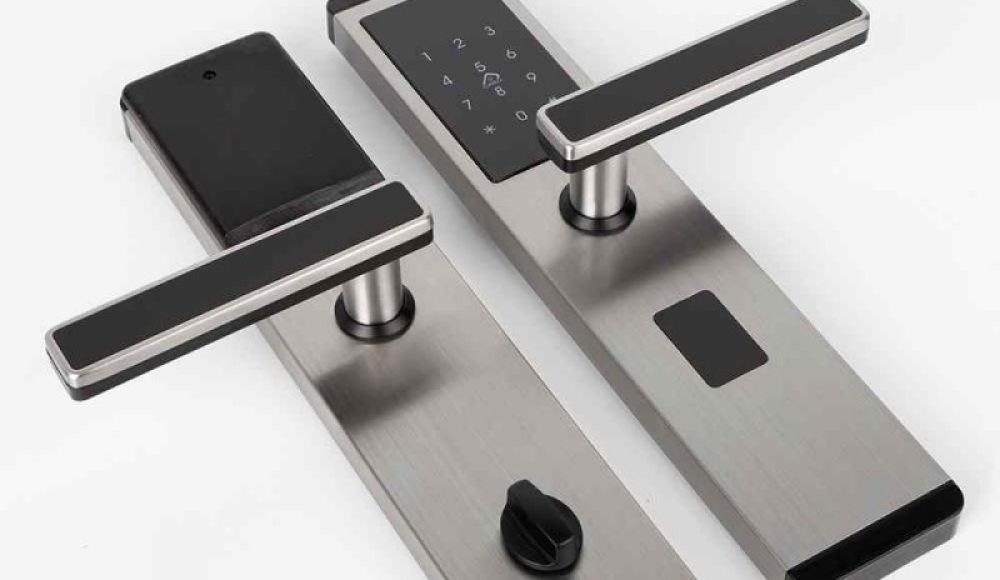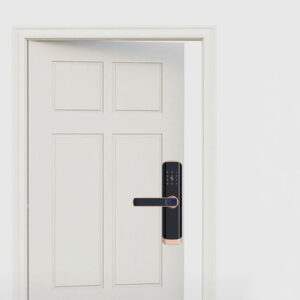Como casas inteligentes, hoteles, y las oficinas adoptan cada vez más bloqueos de huellas digitales de huellas digitales inteligentes, Las preocupaciones sobre la ciberseguridad nunca han sido más relevantes. Mientras que estas cerraduras de alta tecnología ofrecen conveniencia, velocidad, y seguridad física mejorada, Una pregunta crítica persiste tanto para los consumidores como para los integradores: ¿Se puede piratear un bloqueo inteligente de huellas digitales??
Este artículo desglosa los riesgos, protección, y las mejores prácticas en la industria de bloqueo de huellas digitales, especialmente para aplicaciones comerciales y tomadores de decisiones B2B.
🔐 ¿Qué es un bloqueo de huellas digitales digital inteligente??
Una cerradura de huella digital digital inteligente es una cerradura de puerta electrónica que utiliza tecnología biométrica para verificar la identidad del usuario. En lugar de llaves o tarjetas, Los usuarios simplemente colocan el dedo en el sensor para el acceso, típicamente en menos de un segundo. Versiones avanzadas como las líneas de productos de Weisa también admiten desbloqueo de Bluetooth, control de la aplicación, códigos de acceso temporales, y copias de seguridad clave tradicionales.
⚠️ ¿Se pueden piratear estas cerraduras??
Técnicamente, Sí, pero no es fácil
Cualquier dispositivo conectado a señales inalámbricas, datos, o la electricidad puede ser explotada. Sin embargo, la probabilidad de piratear un moderno Bluetooth Lock de puerta de huella digital es extremadamente bajo, Especialmente si el dispositivo proviene de una marca de confianza como Weisa, y sigue las mejores prácticas de seguridad.
Aquí hay preocupaciones comunes y cómo las cerraduras de calidad los manejan:
🔓 1. Huellas dactilares falsas & Falsificación del sensor
Mito: Los intrusos pueden usar huellas digitales impresas o levantadas en 3D para desbloquear su puerta.
Realidad:
Locas modernas, como las de Weisa Locas de puertas de huellas digitales inteligentes personalizadas—Noir sensores capacitivos y detección de vida basada en la IA, lo que significa que pueden distinguir entre un real, dedo vivo y uno falso. Además, La tecnología del sensor puede rechazar huellas digitales parciales o distorsionadas.
📶 2. Bluetooth Hacking & Olfateo
Mito: Los piratas informáticos pueden interceptar señales Bluetooth para obtener acceso.
Realidad:
Las cerraduras de la puerta de huellas digitales de Bluetooth de nivel superior usan cifrado AES de extremo a extremo, códigos dinámicos, y fichas giratorias. Weisa emplea el cifrado de grado militar y la unión del dispositivo a la aplicación, Entonces, incluso si se interceptan las señales, Son inútiles sin dispositivos emparejados.
🔋 3. El interrupción de energía o la falla de la batería
Inquietud: Si la cerradura pierde energía, me bloquearé?
Solución:
Weisa Las cerraduras inteligentes de acero inoxidable cuentan con alertas de batería bajas, Carga de USB de respaldo, y llaves mecánicos tradicionales como fallas. Ningún poder no significa que no hay acceso.
🧠 4. Contraseñas débiles o configuraciones predeterminadas
Riesgo: Muchos usuarios dejan contraseñas de administrador predeterminadas sin cambios.
Mejor práctica:
Cuando utilice la aplicación móvil de Weisa para controlar su bloqueo inteligente de huellas digitales, personalizar siempre las contraseñas, habilitar la autenticación de dos factores, y evite compartir credenciales de inicio de sesión en redes desprotegidas.
🛡️ Cómo Weisa mejora la seguridad del bloqueo de huellas dactilares
✅ 304 Carcasa de acero inoxidable
No solo inteligente, pero físicamente seguros: nuestros modelos de cerraduras inteligentes de acero inoxidable resisten la entrada forzada, perforación, y corrosión ambiental.
✅ Conectividad Bluetooth cifrada
Weisa utiliza BLE 5.0 con cifrado AES-128 y claves de sesión únicas, haciendo prácticamente imposible el acceso inalámbrico no autorizado.
✅ Núcleo de bloqueo inteligente
Las cerraduras de huellas dactilares Weisa incluyen cilindros de cerradura antirrobo y un escudo antimanipulación, prevenir la intrusión incluso cuando los métodos de acceso fallan.
✅ Gestión de la nube + Registros de acceso
Para usuarios comerciales, Nuestras cerraduras ofrecen gestión de registros basada en la nube., para que los administradores puedan rastrear quién accedió a qué puerta, cuando, y cómo: mejorar la rendición de cuentas.
🏨 Caso de uso: Cerraduras comerciales inteligentes con huellas dactilares en hoteles
Los hoteles y espacios de convivencia recurren cada vez más a soluciones personalizadas de cerraduras de puertas inteligentes con huellas dactilares que se integran en los sistemas de check-in móviles.. Weisa ofrece OEM & Soluciones ODM adaptadas a las marcas hoteleras, completo con marca, integración de tarjetas, y gestión basada en aplicaciones.
Combinando seguridad biométrica con un elegante diseño industrial, Las cerraduras Weisa se encuentran en:
-
Hoteles de negocios
-
Alquileres de Airbnb
-
Entradas a oficinas de coworking
-
Apartamentos de alta gama
-
Dormitorios universitarios inteligentes
🧩 Pensamientos finales: Cómo prevenir los hackeos de cerraduras inteligentes
Si bien ningún sistema es 100% inhackeable, el hardware y las prácticas de usuario adecuadas hacen que las cerraduras inteligentes con huellas digitales sean más seguras que las llaves tradicionales o incluso los teclados numéricos.
Mejores prácticas:
-
Compre de fabricantes certificados como Weisa
-
Actualice el firmware periódicamente
-
Cambie los códigos de acceso de administrador e invitados con frecuencia
-
Monitorear registros de desbloqueo (especialmente en uso comercial)
-
Evite el Wi-Fi público cuando use los controles de la aplicación



